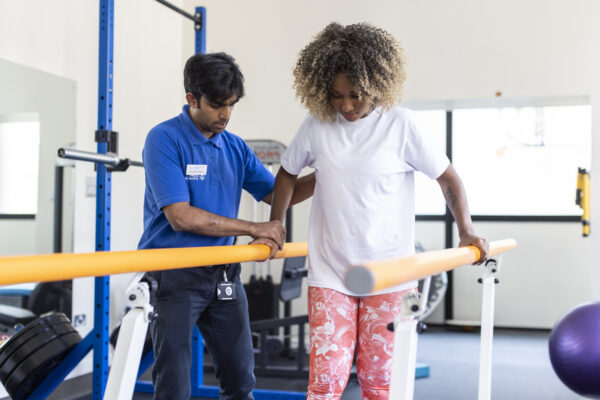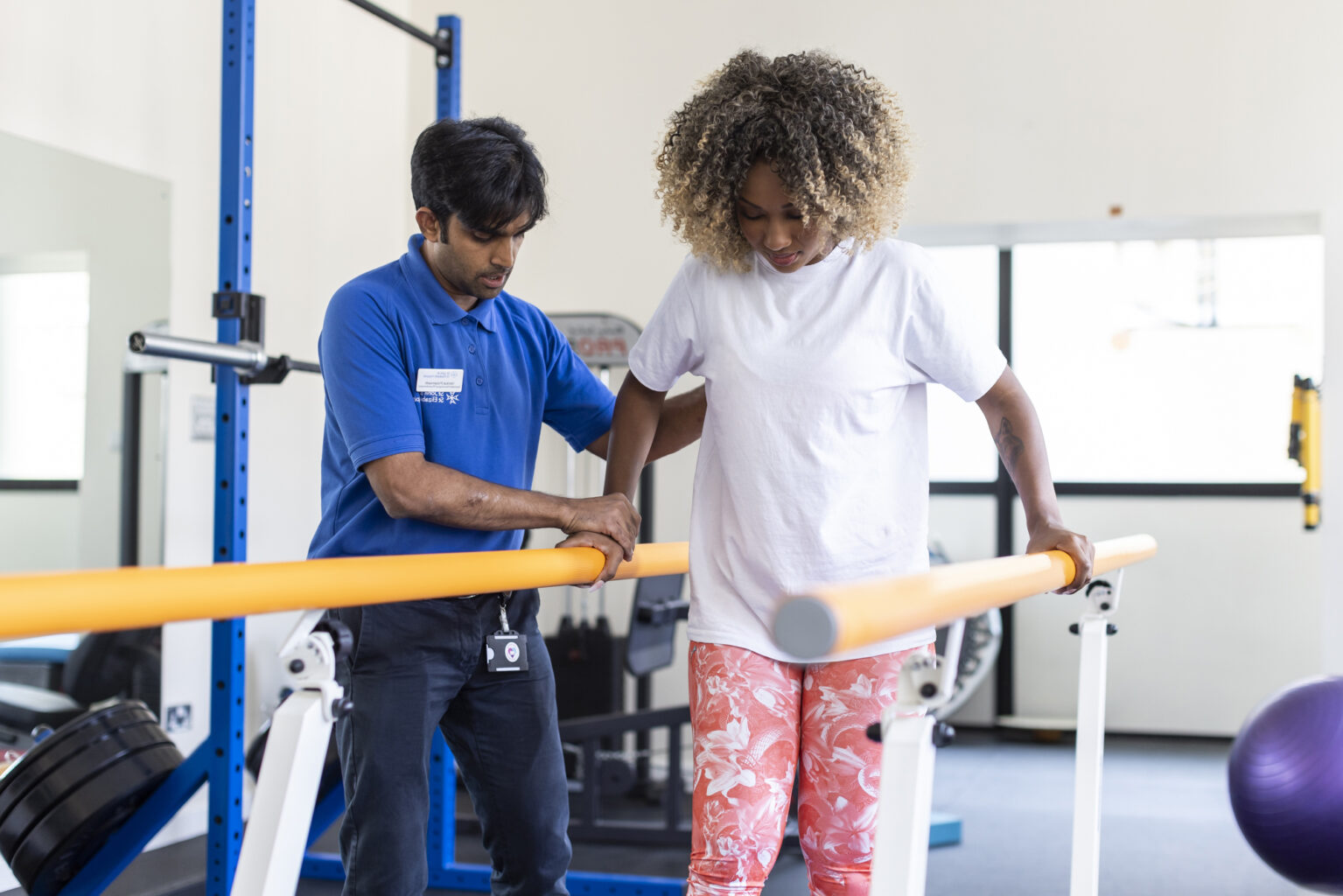Contact number: 020 7806 4060
What is Revision Hip Replacement Surgery?
Revision hip replacement surgery involves removing and replacing components of an existing hip implant. This procedure may be necessary if the original implant has become loose, damaged, or infected, or if there is a need to correct alignment or address wear over time.
While more complex than initial hip replacement surgery, modern techniques allow for an effective hip revision and a successful return to daily activities. Conveniently located in St John’s Wood (NW8), we provide expert care to patients across London, ensuring precise treatment and supporting a smooth recovery tailored to your individual needs.
Revision Hip Replacement Surgery at St John & St Elizabeth Hospital
At St John & St Elizabeth Hospital, we are dedicated to delivering high-quality care in state-of-the-art facilities. Our orthopaedic surgeons have extensive experience in revision procedures, ensuring that each patient receives tailored treatment to meet their individual needs.
Why choose us for your revision hip replacement?
- Specialist Surgeons: Our consultants are experts in complex hip revision surgery, offering personalised solutions to address your specific concerns.
- Prompt Appointments: With access to same-day or next-day consultations and diagnostic imaging, we minimise delays in starting your treatment.
- Advanced Facilities: Our hospital features cutting-edge technology to support effective surgery and recovery.
- Accessible Location: Based in NW8, we are well-positioned for patients from Hampstead (NW3), Kilburn (NW6), and beyond.
From your initial consultation through to post-operative care, we are committed to delivering personalised support and effective treatment that prioritises your recovery and long-term mobility.
Read our in-depth information guide on hip replacements.
Consultants who perform Revision Hip Replacement Surgery
Appointment
You will have an initial consultation with a lower limb orthopaedic surgeon.
Treatment plan
During this appointment, you’ll go through your medical history, the risk and benefits of surgery and what to expect from recovery. Together, you will decide whether a hip replacement is the best option for you.
Pre-op assessment
If you decide to go ahead with surgery, you will need to come in for a pre-assessment, which is a standard ‘fitness for surgery’ check.
Surgery
The surgery itself should take a couple of hours. You will be able to walk with crutches or a walker the same day or the day after and can go home after 24- 48 hours.
Aftercare
You should use crutches or a walker for the first couple of weeks and have someone help you with your activities during this time. You will need rest and follow strict guidelines for 6-8 weeks post-surgery. Most people can start returning to work and their usual activities after 3 – 6 months.
How much does private hip replacement revision cost?
from £17,500*
The cost of a private hip replacement revision is from £17,500* at St John & St Elizabeth Hospital.
*This hospital price is a guide from price only and you will be offered a bespoke price depending on your surgery following pre-assessment. The price shown includes estimated hospital related costs associated with your treatment, from admission to discharge. The price does not include the cost of consultation, diagnostics, or the surgeon or anaesthetist fee.
How to pay for your treatment
If you’re… paying for yourself
Did you know you don’t need private medical insurance to come to St John & St Elizabeth Hospital? As a self-pay patient, you can access safe, outstanding quality health care at times to suit you.
For scans and tests, as well as to see most consultants, you’ll still need to be referred by a medical professional like your GP, but as a self-pay patient, the process is more straightforward. You won’t need authorisation from an insurance provider, and you’ll have greater choice of consultant and appointment times.
If you’re… insured
St John & St Elizabeth Hospital is approved by all major medical insurance companies. If you have a personal private health insurance policy, or your company provide it for you, you can use it to pay for your care from your initial consultation through to treatment, surgery and aftercare such as physiotherapy. Not all private health insurance plans cover the same things. It’s very important to check exactly what you are covered for with your insurance provider.
Frequently Asked Questions About Hip Replacement Revision
St John & St Elizabeth Hospital is located in St John’s Wood (NW8), a well-connected area of North West London. We are easily accessible for patients from Hampstead (NW3), Kilburn (NW6), and surrounding areas.
By Tube:
- St John’s Wood station (Jubilee Line) is just a 5-minute walk from the hospital.
- Finchley Road (NW3) and Kilburn stations (NW6) on the Jubilee Line provide convenient connections.
By Bus:
- Wellington Road: Routes 13, 46, 82, and 113 stop near St John’s Wood Underground Station, just a short walk from the hospital.
- Circus Road: Routes 46 and 187 stop close to the hospital’s Circus Road entrance.
- Abbey Road: Routes 139 and 189 stop near the junction where Grove End Road becomes Abbey Road, providing easy access.
Major Roads:
If you’re travelling from NW3 or NW6, major routes such as Finchley Road or Kilburn High Road provide a direct approach to the hospital.
Our hospital’s location ensures convenient travel for patients across London, particularly those in NW8, NW3, and NW6 postcodes.
If you and your doctor agree hip revision surgery is right for you, aim to eat healthily and stop smoking if possible. Before surgery, you’ll have a pre-assessment that includes blood, heart, and lung tests, as well as an MRSA screening. You’ll also receive antibacterial soaps to use beforehand to reduce infection risk. Let your doctor know if you take blood thinners or NSAIDs, as you may need to adjust these medications leading up to the procedure.
Avoid food, drink, gum, and sweets from midnight before surgery. Wear loose clothing and bring essentials like your toothbrush, phone, charger, any medications, and a change of clothes. After check-in, a nurse will review your medical history, and your doctor will go over the procedure with you again for final consent.
You’ll receive either a general anaesthetic or spinal sedation, ensuring you are asleep throughout. The surgeon will then remove and replace the affected parts of the hip prosthesis. If needed, a bone graft will be used to ensure a good fit, reducing future risks. Each hip prosthesis is made to measure for the best outcome.
You’ll be moved to a private room to start your recovery and may begin walking the same day or the next with support. Our nursing team will check on your progress, and a physiotherapist will help you with early mobility. You’ll be discharged within 24-48 hours, following clearance by the medical team and final checks like X-rays and blood tests.
For 6-8 weeks, you’ll need to avoid bending your hip beyond 90 degrees, crossing your legs, or twisting while standing. Showers are preferable to baths, and you should use crutches or a walker. Physiotherapy can usually begin around four weeks, but your surgeon may advise waiting longer depending on your surgery specifics.
Most people return to work within 3-6 months, though full recovery can take up to 18 months, especially if the surgery involved cutting bone or reattaching muscles. If you experience any pain, reach out to our team for support to keep your recovery on track.
Whether it’s physical therapy, using a walking stick, or simply not rushing your recovery, it’s critical to take each day at a time, as with a revision hip surgery, it will take some time to get back to normal.
After surgery, you should also comply with your physiotherapy programme, take painkillers when needed and keep your wound clean and dry.
Sometimes, painkillers can make you constipated, so drink plenty of water and have a healthy intake of fruit and vegetables. It’s also important to have decent quality nutrition as this will help your body recover to the best of its ability.
In the longer term, you should be mindful of the activities you engage in because there is a small risk of hip dislocation.
To summarise, if you comply with your physio rehab – i.e. strengthening, stretching and balancing exercises, keep walking and moving, and follow your wound care guidelines, you can expect excellent outcomes after surgery.
A revision hip replacement can last 10 to 20 years, depending on factors such as the type of implant, the patient’s activity level, and overall health. Advances in materials and surgical techniques have improved the longevity of revision implants, but they may not last as long as primary replacements.
Revision hip replacement can restore mobility and relieve pain effectively, but it is often more complex than primary surgery. The outcomes depend on the reason for the revision, the patient’s health, and the condition of the bone and surrounding tissue. While it may not replicate the success of a primary replacement, a well-executed revision can significantly improve quality of life.
Medically reviewed by Mr Sujith Konan - MBBS MD(res) MRCS FRCS(Tr&Orth), Honorary Associate Professor (UCLH)


